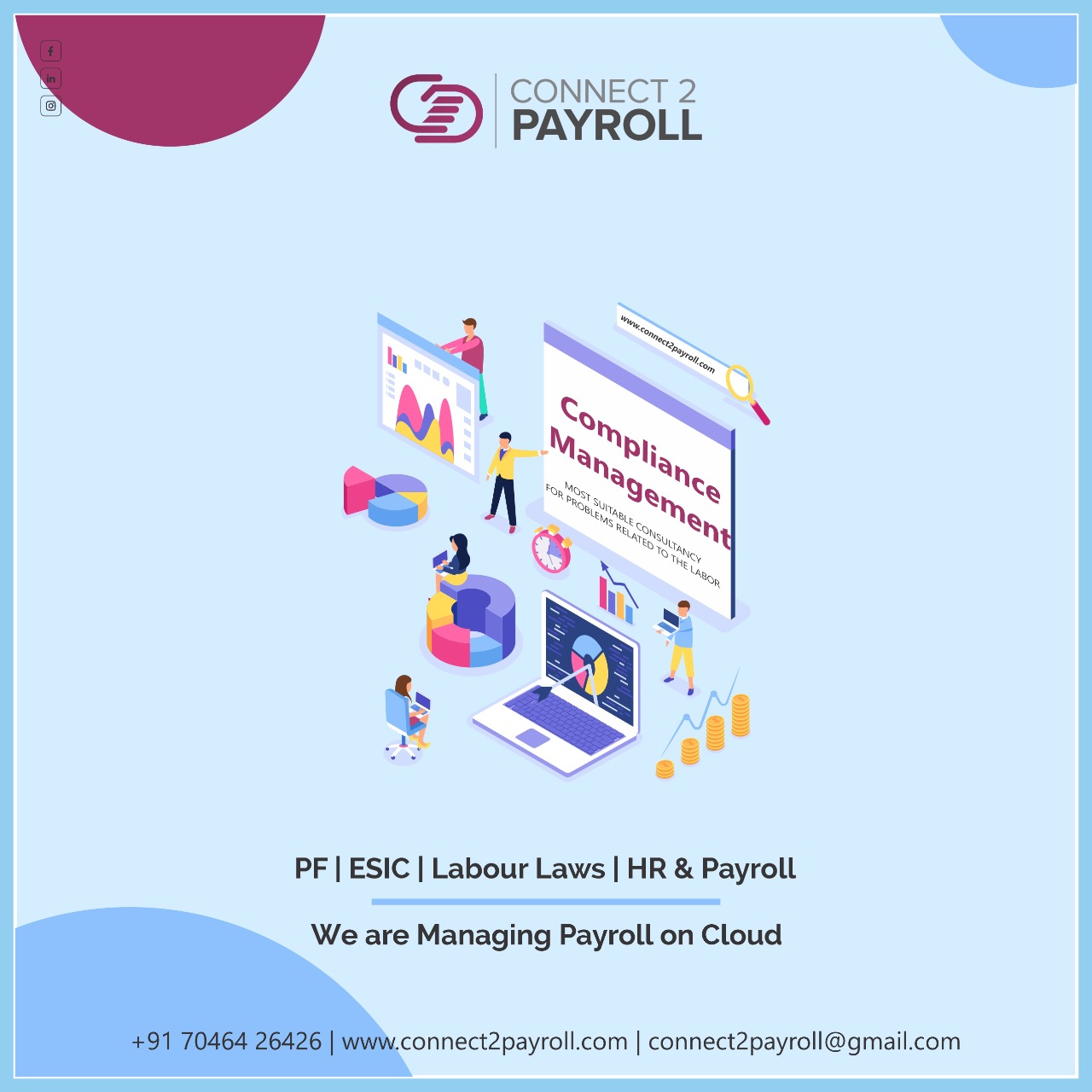
Normal
0
false
false
false
EN-US
X-NONE
X-NONE
/* Style Definitions */
table.MsoNormalTable
{mso-style-name:”Table Normal”;
mso-tstyle-rowband-size:0;
mso-tstyle-colband-size:0;
mso-style-noshow:yes;
mso-style-priority:99;
mso-style-parent:””;
mso-padding-alt:0in 5.4pt 0in 5.4pt;
mso-para-margin-top:0in;
mso-para-margin-right:0in;
mso-para-margin-bottom:8.0pt;
mso-para-margin-left:0in;
line-height:107%;
mso-pagination:widow-orphan;
font-size:11.0pt;
font-family:”Calibri”,”sans-serif”;
mso-ascii-font-family:Calibri;
mso-ascii-theme-font:minor-latin;
mso-hansi-font-family:Calibri;
mso-hansi-theme-font:minor-latin;}
A Big Part of Payroll Compliance Service in Ahmedabad
Making ensuring one follows employment rules, tax laws, and compensation standards forms a major component of payroll administration in every company. Apart from these, Connect 2 Payroll Compliance Services Company in Ahmedabad India. Other equally important criteria include deadlines for reporting and filing, handling payroll taxes or making payroll compliant. Operating a business depends on payroll managed as companies have to be proactive to prevent fines and guarantee seamless operations. Businesses must upgrade their payroll systems in accordance with the most recent legislative developments as we head toward 2025 and beyond.
By crossing all the elements on their payroll solution checklist, companies can guarantee that they are following what payroll process requires. This blog shows important developments to be aware of in 2024 and 2025 as well as a thorough payroll compliance checklist to assist Indian companies negotiate the complexity of payroll administration.
Compliance with payroll checklist
As we have shown, a lot of elements affect the payroll mistakes. How therefore can companies stop problems with Payroll Company from developing?
Every business functioning in India has to abide by many Acts created by the Government for the welfare, safety, and protection of the workers. You have to go over this payroll compliance checklist.
Professional Tax (PT) Income Tax Act, 1961; Employee Provident Fund (EPF) Act, 1952; Employees’s State Insurance (ESI) Act, 1948;
Act pertaining to Gratuity Payment, 1972; Act pertaining to Bonus Payment, 1965
Act of 1948: Minimum Wages Act
Act of 1976: Equal Remuneration Act
Act pertaining to Maternity Benefit 1961
Knowing the structure of payroll compliance
States’ and central laws:
Labour regulations both national and state-specific control payroll company in India. Important laws are:
Wages Act, 1936: Payment of Compensation
Act of 1948: Minimum Wages Act
Bonus Act, 1965 Payment Policy
Apart from this, state-specific rules also apply, hence companies should be informed with both national and state legislation pertinent to their area.
Rules particular to a sector
Payroll-related rules vary among businesses. For example, companies in retail, IT, and manufacturing could have different needs on working hours, leave rules, and employee perks.
List of payroll compliance checks
Employee Provident Fund (EPF) Compliance
Employers and staff members both help the EPF plan.
Make sure EPF contributions pay timely interests.
Keep correct records by turning in forms (EPF-2, EPF-5).
Digitalize your online filings with the Unified Portal for Employee-centric Services (UPES).
Act Compliance on Employees’ State Insurance (ESI)
Check employees’ eligibility based on geography and pay.
Determine and send contributions to the ESI fund.
Record keeping: File forms (ESIC-1, ESIC-2) via the ESI site.
Professional Tax (PT) Compliance
State-specific rules: PT rates differ among Indian states.
File required PT returns and pay your taxes on time.
Minimal Wages Act Compliance
State-specific rates: Make sure staff members get minimum pay commensurate for their state and sector.
Record keeping: Track working hours and pay salaries.
Compliance with Gratuity Payment Act
Calculate eligibility using salary and tenure.
Calculate and distribute gratuity according the Act.
Wages: 2019 Compliance Code
Know fundamental pay breakdowns (allowances).
Pay correct and timely wages.
Record-keeping: Keep thorough payroll notes.
Compliance with Income Taxes
Deduct TDS from employee pay whenever suitable.
Issue Form 16 to staff members and file TDS returns similar to Form 24Q and 26Q.
Employee declarations: For tax purposes, get employee declarations.
Labor laws compliance
Working hours and overtime: Follow legal limitations and pay the necessary overtime.
Policies for leaving: Grant statutory leaves and keeps records.
Other laws: Follow the Maternity Benefit Act and Contract Labour Act among others pertinent ones.
Recent Changes to Payroll Compliance Rules 2024–2025
Changes in income tax:
Updated tax slabs under the New Regime:
₹ 0 – 3,00,000: 0%
5% from ₹ 3,00,001 to 7,00,000.
₹ 7,00,001 – 10,00,000: 10%
¹10,00,001 – 12,00,000: 15%
Above ₹15,00,000: 30%.
Corporate tax updates:
Domestic businesses: same, at 25%.
Corporate tax rate dropped from 40% to 35% for foreign businesses.
TDS rules:
Changed TDS rates:
Section 134D (Insurance Commission): 5% to 2%
Section194H: Commission/brokerage: 5% to 2%
Section 199-O (E-commerce Payments): 1% to 0.1%
EPF rule changes:
Beginning April 1, 2024, EPF accounts will automatically move upon job changes by workers.
Employees can withdraw 90% of their EPF balance at age 54 plus extra provisions for unemployment and crises.
E-sentive updates:
Set employers at 3.25% and workers at 0.75% for contribution rate.
Limit for contract expenditure: ₹5 crores to ₹25 crores.
Apart from ensuring that your Payroll Compliance Services is in place, a well-designed payroll processing checklist will help you to simplify your payroll process, reduce mistakes, and boost the effectiveness of your payroll staff.
Leading firm Connect 2 Payroll has assisted many 500 businesses with their payroll problems. Get in touch with us right now if you want someone to effectively handle your payroll; we will then supply you the appropriate payroll solution for your company.